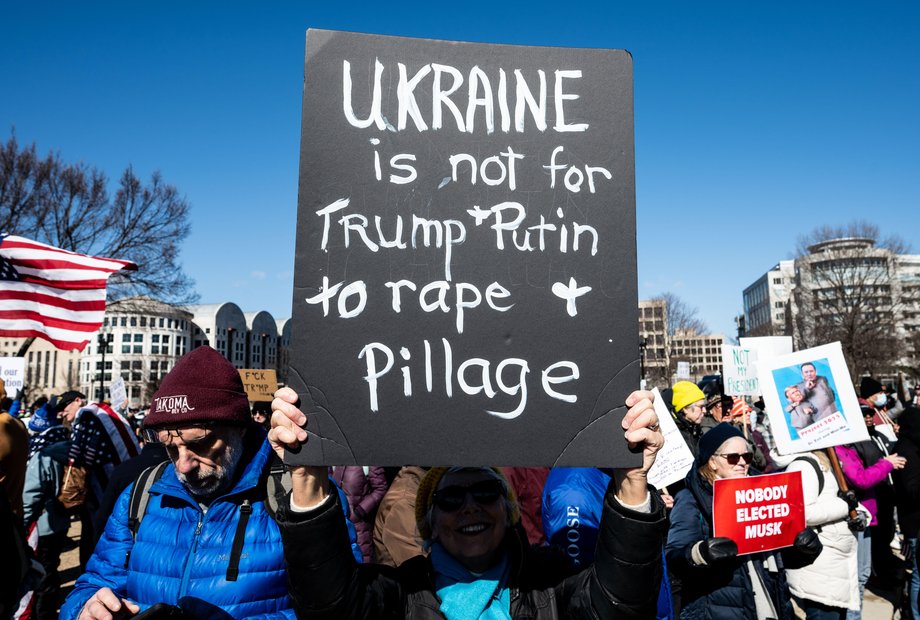Dr. habil. Cornelius Friesendorf and Dr. Wolfgang Zellner
Three years ago, Russian troops advanced towards Kyiv. Since then, the Ukrainian population has been living in a state of terror: Russia has bombed hospitals, established a regime of torture in the occupied territories, and has grown increasingly fascist. Trump’s proposed deal with Putin has dramatically reshaped the situation – including for Germany. A new federal government must significantly increase military aid to Ukraine and publicly justify this decision, as populists will argue that such a deal renders military assistance unnecessary.
Moscow triumphant
Trump’s initiative is a dream come true for the Kremlin. Moscow negotiates directly with the United States, while Ukrainians are relegated to a subordinate role – reminiscent of the 1938 Munich Agreement, in which France, Britain, Italy, and Nazi Germany decided that Czechoslovakia must cede the Sudetenland to Germany. Czechoslovakia was not even invited to the conference.
Ukraine is to be barred from NATO membership. Conceding this before negotiations even began was a fundamental misstep, especially for someone who prides himself on his deal-making abilities. Above all, Moscow can celebrate the fact that the United States is disengaging from Europe – one of its core strategic objectives since the Soviet era.
Neither just nor stable
Rather than a just peace, this will likely be a dictated settlement. Nor will the proposed deal lead to lasting stability. Research into the motivations behind Russian security policy suggests that a genuine balance of interests – one that curtails Russia’s territorial revisionism – is impossible under the current Kremlin leadership.
One key driving force among Russian elites is the aspiration that Russia be recognised as a great power. Trump is now acceding to this imperialist desire, gambling with Ukraine’s sovereignty and reverting to a 19th-century order in which only great powers matter. Another key motivation is regime stability: Putin’s kleptocracy cannot tolerate a functional, democratic Ukraine, as its success could imperil Russia’s own regime. A third factor is Russia’s extensive threat perception, which not even substantial US concessions – such as neutralising Ukraine – are likely to alleviate. The desire for strategic depth extends beyond Ukraine, as demonstrated by Russia’s 2021 demands on the United States and NATO.
Beyond these drivers of Russian revisionism, there is also empirical evidence that Russia is not a reliable partner. Following a ceasefire or peace treaty, the Kremlin could well instruct its commanders to test an international peacekeeping force through attacks. Should NATO troops be involved in such an operation, this could lead to direct military engagements between Russian and NATO forces.
The deal and Germany
What does the toxic convergence of worldviews between the Kremlin and the White House mean for Germany’s new government? Above all, it necessitates far greater German military assistance to Ukraine. The goal must be to strengthen Ukraine to the extent that it can either conventionally deter or withstand further Russian attacks. Conventional military support from European states is the least bad of all available security guarantees – given that NATO membership is off the table, US military aid may cease, and Putin is likely to violate any peace treaty once Russia’s armed forces have regrouped.
Germany’s support for Ukraine should form part of a broader strategy against Russia, developed in concert with European partners – particularly the United Kingdom, France, Poland, the Baltic states, and the Nordic countries – within NATO. Attempts to coordinate this approach at the EU level are unlikely to succeed, given divergent interests of EU member states and the role of Hungary as an enabler of Russia.
Rearmament will be extremely costly, as what is ultimately at stake is not only Ukraine but also conventionally deterring a Russian attack on NATO territory. Defence budgets will need to be in the three-digit billion range, requiring special funds or the suspension of Germany’s debt brake.
Populist parties will exploit this for propaganda purposes. That said, Trump’s deal does not mean that all is now well; on the contrary, it highlights the pressing need for Germany to bolster Ukraine and European NATO members militarily. To prevent the AfD and the BSW from dominating the debate, the new government must explain why, in an existential crisis, it is justified in imposing financial burdens that will extend to future generations. When dealing with a revisionist nuclear power, there are no comfortable solutions.
Dr. habil. Cornelius Friesendorf is Senior Researcher and Head of the Centre for OSCE Research (CORE) at IFSH.
Dr. Wolfgang Zellner is Senior Research Fellow and former Deputy Scientific Director and Head of the Centre for OSCE Research (CORE) at IFSH.





